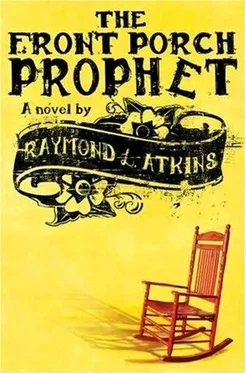But there was one small blemish to clear up before she returned to scholastic life. Found among the ruins of the camp-in Regina’s sleeping bag, to be exact-was five pounds of high-quality black Jamaican marijuana. The cache was discovered by Slim, and Regina’s partial amnesia conveniently extended to cover the origin of the substance. So although she had been almost raped and nearly killed, Slim held her pending investigation of the drug charge.
“Any one of four dead guys he could nail, and Slim tries to hang it on the girl,” Eugene said when he heard the news. He was disgusted. “Hell, I wish I had found it. It damn sure wouldn’t be a problem now.”
A.J. had no doubts on that score, and he found it unusual that Eugene had missed the stash when he had dashed back to retrieve his gun, because he hadn’t overlooked anything else. He had reclaimed his pistol and its spent shell casings as well as retrieving A.J.’s fingerprints from both the bat and the M-16. He had replaced them with his own.
Regina’s father, Mr. Deberry, Esquire, was a man of repute in the legal community, and he roared into town with the full intention of “straightening some country ass out.” He spent exactly seventeen minutes with Slim, and when he emerged from the town hall, he had his daughter. Slim remained inside. Mr. Deberry- Deeb to his friends-then sought out Eugene, who had succeeded in taking full responsibility for the killings despite A.J.’s best efforts to shift the blame to its rightful owner. Deeb found Eugene down at the beer joint, and they quaffed a couple while he thanked Eugene for saving his daughter. Eugene was free on a property bond pending the outcome of the inquest, a guarantee posted by John Robert Longstreet because Johnny Mack wouldn’t sign. Deeb told Eugene his legal woes would be handled as soon as he got back to Atlanta, and he proved to be a man of his word.
As for the departed in the woods, they were dead first and foremost, and not a great deal more could be added. The three A.J. had dispatched were the intended buyers of the marijuana. Kenneth was Regina’s muscle on the deal, and Regina was the purveyor. The problem had been one of league. She was accustomed to dealing a little doobie down at the hallowed halls, and in that venue dissatisfied customers did not as a general habit rape and then kill their suppliers.
Playing with the big boys proved to have its own set of rules, but Regina was an intelligent woman who did not have to be told twice. She contracted with Eugene-whom she mistakenly believed would kill for her-to distribute all the black Jamaican she could provide, and since he warranted she would make a fair profit and not be ravaged or terminated, a partnership was born that lasted for several years.
This left the loose end of A.J. and Maggie. One of his main concerns-aside from Lukey in the Reidsville shower stall-was how Maggie would react when informed her beloved had killed more people than Lee Harvey Oswald, James Earl Ray, and Sirhan Sirhan, if that was his real name. But he told her anyway and was surprised to discover her thoughts on the affair were similar to Eugene’s.
“Eugene was right. He could get away with it. You they would have hung.” She spoke in a sardonic tone. “Anyway, he really wanted the credit. Can’t you tell? He gets to be a hero without being a hero.” And that was that, except for her comment on the act itself. After describing to her the scene at the campground, Maggie’s response was cool and measured.
“Good. I hope it hurt.”
Establish a scholarship in my name with the enclosed $5000.00.
– Excerpt of posthumous letter from Eugene Purdue to the management of The Panther Club
A.J.’S WALK WITH MAYHEM WAS ANCIENT HISTORY, but it had taken center stage in his consciousness when Eugene had chosen to refer to the incident, and A.J. had been in a foul frame of mind ever since. His mood remained sour until the following Wednesday, when he was summoned to the mill for an early meeting. At that point, his disposition really decayed. He normally reported at 4:00 p.m. and turned logs into boards until 2:00 a.m. the following morning. He called it the Bermuda Shift, because many hapless souls had wandered onto it over the years, never to be seen again. He was sitting at the kitchen table drinking coffee with John Robert when the phone call came.
“A.J., there’s a meeting at two o’clock,” said Marie Prater. She had been an institution at the sawmill for many years. “You have to be here.” Marie was John McCord’s secretary, and John McCord was president and general manager of McCord Lumber. She was a formidable woman, seldom wrong and rarely challenged. Her husband, Randall, was disabled, having suffered from a bad back since about the time he was old enough to perform any work. This affliction was hereditary and had stricken his father and grandfather, and others before that. Marie’s children-four teenaged boys with bad backs-amazed A.J., because he could not envision Randall expending the energy necessary to father them. In truth, none of the boys favored Randall much, and one of them was the spitting image of John McCord, so perhaps Marie had been forced to make other arrangements.
“What’s the meeting about?” A.J. asked, still groggy. The previous evening’s sawmill outing had been challenging, and he hadn’t been up long. He hated early meetings and had pointed out on numerous occasions that if they were periodically scheduled for 3:00 a.m., then the day staff would be afforded equal opportunity to come in a couple of hours early. This suggestion had yet to be acted upon.
“I’m not supposed to say, but what the hell?” Marie replied. “John sold the mill. The new owners want to meet all the supervisors and managers.” Rumors had been flying around the mill for weeks that a large lumber conglomerate was eyeing the property, and A.J. felt a stir of apprehension. The scuttlebutt had apparently been well-founded.
“Oh, shit,” he said into the phone.
“You’d be surprised how many times I’ve heard that in the last couple of hours,” was her reply. “Oh, hell, and goddamn have also been popular. All of you boys need to be watchin’ that language.” Marie was teasing A.J. in an attempt to lighten the moment. She was known throughout the Southeast and in three foreign ports for her richly descriptive turn of phrase.
“Sorry about that, Marie,” A.J. replied. “You know I don’t think of you as a woman at all. You’re just one of the guys to me.” His mind was on the news she had imparted.
“Thanks a lot. Two o’clock,” she said before hanging up. A.J. took a swig of coffee and sat quietly, thinking. Although the news at face value was not necessarily bad, he had a feeling that it would turn out to be so. He didn’t know a great deal about Big Business, but he knew enough to realize he had just made the transition from big fish in a small lake to small fish in the middle of the ocean, if he was lucky, and dead fish in the creel if he was not. He turned to John Robert, who was watching him.
“McCord sold the sawmill,” he told his father. “I have to go in to see who owns me now.” John Robert digested the information for a moment.
“Well, he’s older than I am,” he offered. “I guess it’s time for him to retire.”
“Hell, he’s already rich,” A.J. said. “Why does he want to be richer?”
“Don’t get upset until you know what you’re dealing with,” John Robert replied while refilling A.J.’s cup. “These new people will know a good man when they see one. You’ll land on your feet.”
John Robert had moved in with A.J. and Maggie six years previously after suffering a near-fatal heart attack. Luckily he had been in town and not somewhere out on the back forty when the bell tolled, so help was quick to arrive when he keeled over while having a cup of coffee and a couple of collision mats down at The Meek Shall Inherit the Chili-Mac Drive-In.
Читать дальше












